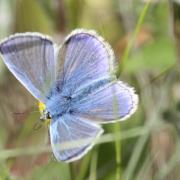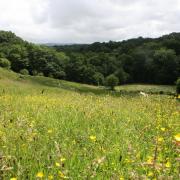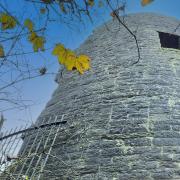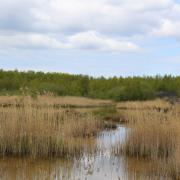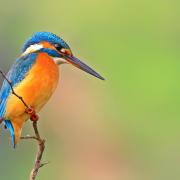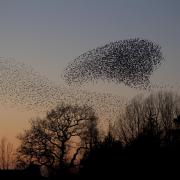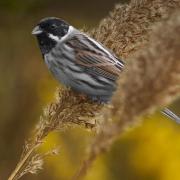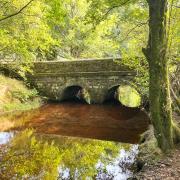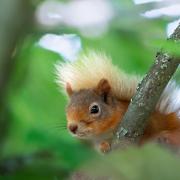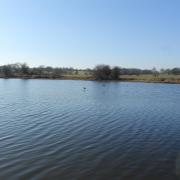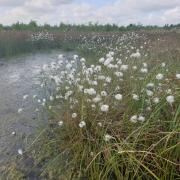The catwalks of Europe will soon be graced with high fashion made from a very special fibre produced in a remote part of Lancashire

The wild moorland of East Lancashire seems a million miles from the glamorous world of catwalks and super models associated with the Milan fashion industry. And yet a slightly comical, camel-like creature from South America links the two.
Lancashire has one of the world's top alpaca herds and demand is rocketing for the quality fibre produced by shearing these fascinating creatures. Even the great Italian fashion house of Versace is producing some evening gowns using cloth woven from animals kept at Blackberry Alpacas in Laneshawbridge near Colne.
Harvey and Claudeen Brown farm 250 acres and they've been in the alpaca business for just over a decade. The couple - Claudeen is from Clitheroe and Harvey originates from the Cotswolds - decided to sell their engineering company and looked for a small farm where they could look after their horses. They ended up in Oswaldtwistle.
'It sounds a bit corny but we wanted to get back to nature and we loved every minute of it,' says Harvey. 'At the same time, we wanted to find a way of making a living but it's incredibly difficult to do that with a small farm.

'Then, I got talking to a friend in haulage. He was transporting two alpacas to Italy. I was astonished to discover these top grade stud alpacas were each worth between £13,000 and £18,000.'
After research on the internet they hunted out the UK's best black alpacas to create their own herd which is now at Laithe Farm in Laneshawbridge. 'I wasn't interested in competing on cost because if you do that your quality just isn't good enough,' adds Harvey.
'I bought four girls at £8,000 each and it's the best thing we've ever done. As a business it has been remarkably successful and it has allowed us to meet people across the world.'
They have travelled to Australia and New Zealand as well as Peru, the home of the alpacas.

'I spoke to a friend who was a tailor and he got quite excited by the prospect of cloth made from alpaca fibre and a chap in Savile Row wanted more than we could possibly produce for suits. The quality is exceptional - they are the only animals that produce this amazing blue-black fibre. It doesn't require dying and it doesn't fade.
'Unlike most wool, it doesn't contain any lanolin so it doesn't need detergents to clean it - you can use cold water which makes it eco-friendly.'
From those four females, they now have a herd of more than 200 in Lancashire and more than 300 farmed by a friend in Australia. 'One of the best alpaca breeders in the world wanted to sell up, so we bought the herd,' says Harvey.
Blackberry Alpacas and the Canchones herd in Australia form one of the biggest specialist black fibre herds anywhere in the world and the Lancashire animals have been exported to many countries including Qatar, Italy, France, Norway and Sweden.
'More people are realising the business opportunities created by the quality alpaca fleeces which are incredibly fine and remarkable versatile,' adds Harvey. 'It is even used by the military for socks because it doesn't absorb moisture like traditional threads.'
While the demand for luxury fibre goes up, drought conditions around the world have made life difficult for those producing merino from sheep and cashmere from goats. Alpacas need relatively little space - an acre can accommodate between three and five - they drink little water, cope well with poor quality vegetation and, unlike sheep, they don't try to break through enclosures.
They eat grass without ripping it out by the roots so they are gentle on pastures and their dried poo makes excellent manure. They also have a friendly disposition, although males can be a little feisty - they have been known to spit when they are put together.
As breeders, Harvey and Claudeen sell many for pets or to people who want to farm them for their wool. They never go for meat production. They also operate a collective that helps owners sell the fibre. 'I could sell the entire herd tomorrow if I wanted to - the demand is increasing all the time and we don't produce anywhere near enough,' says Harvey.
He operates a stud with some male alpacas that have won major international awards. 'In the last 30 years the numbers in this country have gone from a few hundred to 45,000 but we can't keep up with demand.'
The only down side is that Harvey has struggled to find a British mill that is able to turn the fibre into this special cloth because they are mainly geared up for sheep wool so much of its goes to Italy to be woven.
Harvey describes it as one of the most successful and profitable farming enterprises. 'Some of the traditional farmers around here thought we were bonkers,' says Harvey. 'But I can't think of another way we could have made the money we have with so little land. And, most importantly, I can't begin to tell you how much pleasure it has given us. Sometimes, I have to pinch myself!'
To find out more go to blackberryalpacas.co.uk.




